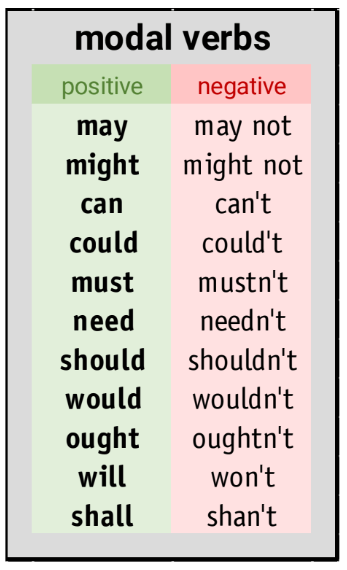Modal verbs are auxiliary words that express the ‘mood’ of verbs associated with them. In short, they qualify verbs. For example, consider ‘teach’ as a verb, and ‘I teach’ as a sentence. So now, prefixing the verb with any modal verb results in different shades of specificity to this sentence: I will teach, I could teach, I must teach, I might teach. All these are fairly straightforward except for the two modal verbs shall and will. What makes shall and will complicated is that firstly, both carry the same meanings. Secondly, they both carry two meanings:
Meaning #1: A desire, an intention, or a future event as a consequence. (It is raining, I shall be late. At the next intersection, if you turn right, you will reach the post office.)
Meaning #2: A non-negotiable assertion, promise, or command. (I will return this book by the weekend. You shall drive only on the left side of the road.)
As can be seen from the examples, what meaning these two modal verbs take depends on whether they are associated with first, second, or third-person pronouns. When used with first-person pronouns, shall takes meaning #1 and will takes meaning #2.When used with second and third-

’ person pronouns, the meanings are reversed. This is the tricky differentiator. Shalt and wilt are archaic forms (second person usage) of shall and will which shows up in the KJV. In contemporary usage on either side of the Atlantic, these rules are diluted. The KJV however adheres to the rule scrupulously. Let’s consider some Scripture examples:
Meaning #1: A desire, an intention, or a future event as a consequence.
When associated with first-person pronouns (I, we) the modal verb ‘shall’ takes on this meaning.
1 Cor 15:49 As we have borne the image of the earthy, we shall also bear of the heavenly.
Psa 23:1 The LORD is my shepherd; I shall not want.
1 Cor 13:12 Now I know in part; but then I shall know even as also I am known.
Rom 6:8 Now if we be dead with Christ, we believe that we shall also live with him.
When associated with second-person pronouns (you, thou, thine) or third-person pronouns (he, him, she, her, they, them, it), the modal verb ‘will’ takes on this meaning.
Exo 4:8 If they will not hearken to the voice of the first sign, that they will believe the voice of the latter sign.
Psa 16:10 Therefore my heart is glad… for thou wilt not leave my soul in hell.
John 15:20 If they have persecuted me, they will also persecute you.
Matt 16:2 When it is evening, ye say, It will be fair weather: for the sky is red.
Meaning #2: A non-negotiable promise or assertion; or a command
When associated with first-person pronouns (I, we) the modal verb ‘will’ takes on this meaning.
Gen 7:4 Yet seven days, and I will cause it to rain upon the earth.
Exo 19:8 And all the people answered together, and said, All that the LORD hath spoken we will do.
Psa 118:24 This is the day which the LORD hath made; we will rejoice and be glad in it.
Dan 2:7 Let the king tell the dream, and we will shew the interpretation of it.
When associated with second-person pronouns (you, thou, thine) or third-person pronouns (he, him, she, her, they, them, it), the modal verb ‘shall’ takes on this meaning.
Gen 2:24 Therefore shall a man leave his father and his mother, and shall cleave unto his wife: and they shall be one flesh.
Exo 20:15 Thou shalt not steal.
Mark 16:16 He that believeth and is baptized shall be saved; but he that believeth not shall be damned. And these signs shall follow them that believe;
James 5:15 And the prayer of faith shall save the sick, and the Lord shall raise him up; and if he have committed sins, they shall be forgiven him.
Here are some meticulously composed Scripture texts where both modal verbs shall and will are used with either the same or different personal pronouns. If you closely observe these associated pronouns, it brings about a certain clarity and meaningful insight.
Exo 19:5 If ye will (a future event) keep my covenant, then ye shall (a promise) be a peculiar treasure unto me above all people.
Matt 19:21 If thou wilt (a future event) be perfect, go and sell that thou hast, and give to the poor, and thou shalt (a promise) have treasure in heaven.
Matt 12:18 Behold my servant, in whom my soul is well pleased: I will (a promise) put my spirit upon him, and he shall (an assertion) shew judgment to the Gentiles.
Luke 11:49 Therefore also said the wisdom of God, I will (a promise) send them prophets and apostles, and some of them they shall (an assertion) slay and persecute:
John 14:16 And I will (a promise) pray the Father, and he shall (a promise) give you another Comforter.
Heb 10:37 For yet a little while, and he that shall (an assertion) come (he) will (future event) come.
Dan 3:17,18 Our God is able to deliver us from the fiery furnace, and he will (a future event) deliver us out of thine hand, O king. But if not, be it known unto thee, that we will (an assertion) not serve thy gods, nor worship the golden image which thou hast set up.


